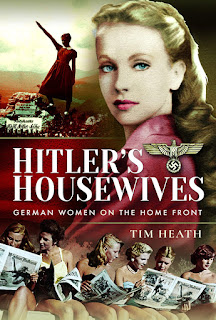This is the second book I've read by Tim Heath. The first was Creating Hitler's Germany. He's also written Hitler's Girls, Women of the Third Reich and In Hitler's Shadow. As can readily be seen from the titles alone, they all share certain themes, chiefly around women and the home front in Germany, during (and leading up to) WWII.
Both of the Heath books I've read so far are overwhelmingly made up of extensive quotes, attributed to personal correspondents, with fairly minimal connecting material from the author. My biggest issue at present, something I flagged after reading/reviewing Creating Hitler's Germany, and I feel even more strongly now, having just read Hitler's Housewives, is his sources.
Most history books - especially those by professional/academic historians - are, and rightly so, painfully scrupulous about making their sources clear. In any field of history this is, I feel, crucial. Otherwise it could either be, at the worst, all made up (remember the whole 'Hitler Diaries' fiasco?), or, and still not right, 'sexed up'.
And it's this possibility - very literally in this case (the erotic elements of numerous accounts are one of several things that have raised my suspicion antennae; other things include English vernacular in alleged WWII-era German diaries, technical or historical info that sounds more 'military buff' than German housewife, etc.) - that casts a shadow over these works.
The narrative content, if genuine, is fascinating. And work on the domestic/home front, the female experience of WWII, and the minutiae of everyday life under extreme circumstances are all welcome. But for me the issue of verifiable sources is a serious stumbling block.
In conclusion: a potentially useful and interesting addition to WWII historical literature, especially so in that it shows aspects of these events often ignored or glossed over. But with the significant caveat that the authors' sources cannot, at present, be verified.
NOTES:
As far as I'm aware, other and more readily credible historians who rely heavily on firsthand accounts cite sources that can somehow be verified. I'm not sure if there's a standard process, but I gather (from other reading) that most countries have numerous bodies whose roles include the collection and archiving of historical testimonies. Whether or how such bodies vet such materials is beyond my ken, at present.
I would imagine that authors seeking to meet standard forms of professional historical credibility would be expected to submit any new materials they unearth in their researches to such archives. Without such fact-checking procedures authors would be free to make stuff up with relative impunity. I'm not saying Heath is creating works of pure fiction. Only that the reader should be aware that without any means to verify sources the material needs to be viewed with a degree of circumspection.






0 Yorumlar